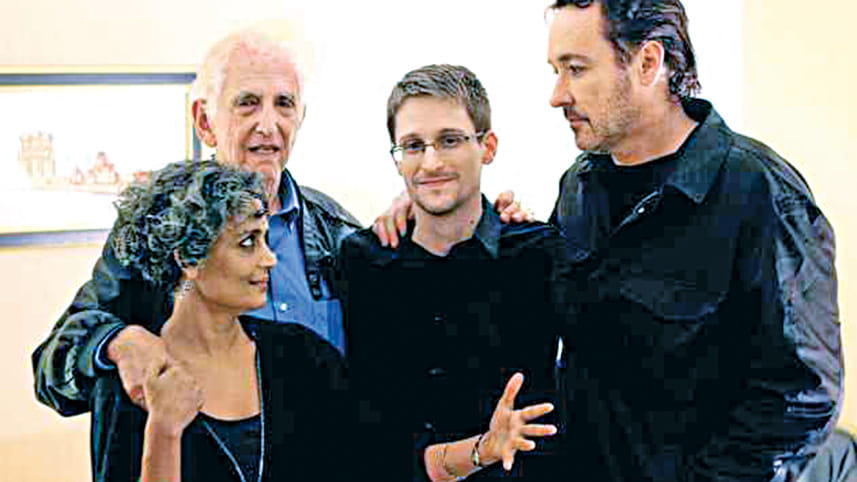Review of Arundhati Roy’s Things that can and cannot be said

After I finished Things that can and cannot be said, I stood in awe of how much power I held in my hands. In this slim volume were the musings, passing insights, and finally, the long-awaited encounter—albeit censored—of some of the strongest voices against modern-day empire.
Booker-winning writer Arundhati Roy and actor John Cusack travel to Moscow to meet Edward Snowden, the famed NSA whistleblower, and Vietnam-era intelligence hero Daniel Ellsberg, famous for leaking the Pentagon Papers. Through a series of informal essays and conversations (mostly between Roy and Cusack in the lead-up to the meeting), the surveillance debate is explored outside of the familiar context of privacy rights of US citizens and Western-centric corporate overreach, to include a broader discussion of global security and freedom.

To someone unexposed to Roy's political writing, this serves as a great primer. Even if you don't agree with her politics, her biting, poetic precision cuts to the heart of surveillance issues and everything it entails: security, nationalism, nuclear war, imperialism, morality. The format is raw and to-the-point even though it's edited and sequenced. It remains a conversation. Though it's not as polished and well-researched as her essays, it's not supposed to be—it's a series of thoughtful inspections of the world where a passing comment carries volumes of context and significance. It leaves you wanting, but it's this density of thought that gives it power and poignancy.
A central theme is an irreverence for borders and, naturally, the questioning of government. Roy calls for a new, radical reimagining, and repeatedly asks Cusack in their conversations, what is a country, anyway? It's just an "administrative unit, a glorified municipality" and so why should we imbue it with esoteric meaning and protect it with nuclear bombs? Roy ponders sets of contradictions: "When people say, 'Tell me about India,' I say, 'Which India? ... The land of poetry and mad rebellion? The one that produces haunting music and exquisite textiles? The one that invented the caste system and celebrates the genocide of Muslims and Sikhs and the lynching of Dalits? The country of dollar billionaires? Or the one in which 800 million live on less than half a dollar a day?'"
She doesn't pull any punches—together, her talks with Cusack span the occasional hypocrisy of preaching nonviolence, the funding and depoliticisation of NGOs, capitalist rebranding, the moral super-state and Washington's inability to win its wars. It's thoughtful and sharp, but fast. The brisk pace makes it such that the quick repartees can leave you feeling more scattered than inspired, at least on the first read. However, it can serve as a jumping off point for her other work. Personally, whatever dots I didn't connect on the first read, I could on the second, even more after another reread once I read her fiction (The God of Small Things, The Ministry of Utmost Happiness) and collected essays, The End of Imagination. Many of the comments here merit entire, thought-out essays there.
The main disclaimer about this book is that it is billed as a conversation between Snowden, Ellsberg and Cusack, which it didn't end up being. It was an informal meeting, so it wasn't recorded and was squeezed in at the end like an afterthought. So be warned: this isn't the place where your favorite dissidents and whistleblowers meet up and make candid jokes about the state of the world. Or, at least, not jokes we get to hear. But somehow, from the conversations Roy and Cusack have before, walking the streets of Chicago, strolling around the Red Square, and attending stuffy human rights galas, you get a sense of what could have been said in that encounter.
In the diplomatic refuge of a hotel room, four politically exiled activists gather together to discuss their banishment, their privilege, and their ties to larger mass movements of exile. What does it mean to be exiled for a crime that is arguably an inherently patriotic act? Though we don't get the transcript, we get certain snippets: Cusack describes the scene once Snowden left the room and Ellsberg, after their talk of terrorism, war, greed, the police state and patriotism, began to weep.
Cusack narrates, "Through his tears, [Ellsberg] said 'That the best thing that the best people in our country like Ed can do is go to prison … it's horrible, you know ...' Roy's eyes were sympathetic but distinctly unsettled."
There is something to be said about the writing in this book—it's like a shot to the heart. It is deeply moving and deeply sad. The questions posed are neither radical nor particularly conservative, but they are posed with such a stirring innocence that they seem like the simplest questions in the world: "What sort of love is this love that we have for countries? What sort of country is it that will ever live up to our dreams? What sort of dreams were these that have been broken?"
The book ends on this love, and once it was closed, I was left with an unshakeable impression that we had all this power in our hands. That instances of profound moral courage are out there, and waning. That conversations must be had about statehood, borders, power and above all, questioning.
Rayna Salam is an intern at Star Weekend. She is studying International Development and Statistics at the University of California, Los Angeles.



 For all latest news, follow The Daily Star's Google News channel.
For all latest news, follow The Daily Star's Google News channel.
Comments